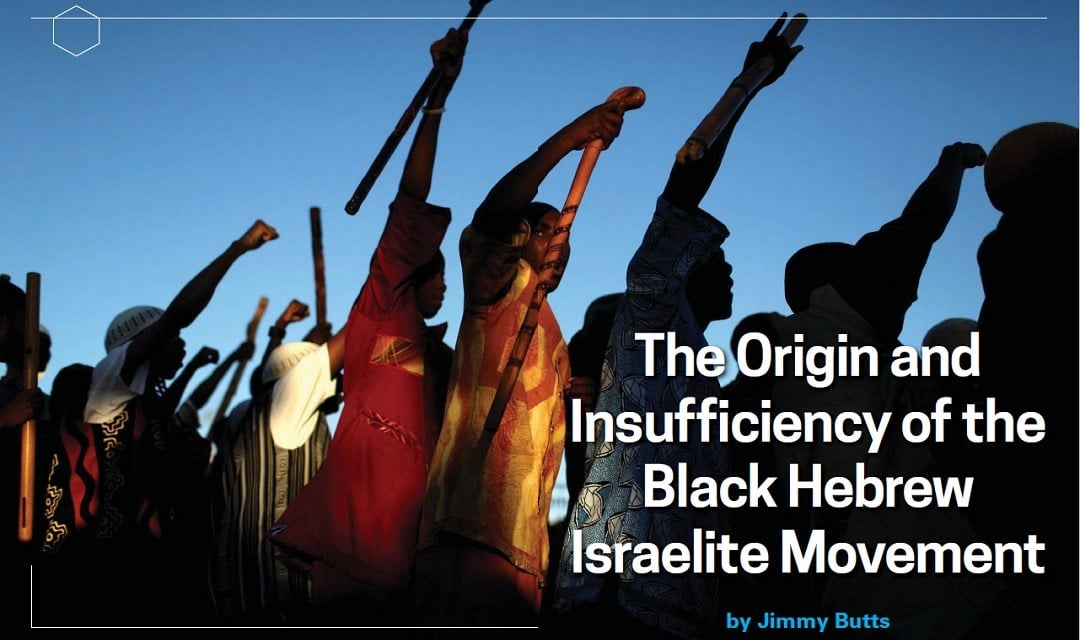Listen to this article (21:17 min)
SYNOPSIS
Similar to the early church, African American Christianity historically has focused more on survival in the midst of persecution and oppression rather than systematizing doctrine. This historical context left both groups vulnerable to false teaching. However, just as the early church birthed theologians and apologists to respond to these new challenges, African Americans have come to a point in their history where there is a need for a response to teachings that have capitalized on their vulnerability.
The Black Hebrew Israelites is one group that has infiltrated black communities to preach a gospel that is contrary to Scripture. A familiarity with the history of African American Christianity will shed light on the origins of this movement. Tracing the Exodus motif in early African American Christianity reveals that the claims of Black Hebrews originate from a shift from symbolic to literal identification with the biblical Hebrews. Furthermore, the claim that all African Americans are Hebrews ignores the historical and scientifically verifiable fact that African slaves were brought from a multitude of diverse countries in Africa. Consequently, the Black Hebrew doctrine conflicts with the ethnic diversity of African Americans.
Considering life’s most ultimate question—How do I get right with God?—the Black Hebrew Israelite doctrine is impotent. Pauline soteriology rejects any claim of advantage before God based on ethnic identification or attempts to keep the Law of Moses. Although Black Hebraism addresses important issues in black communities, their worldview is founded on an unstable foundation.
Many religious philosophies flourish because Christians do not give adequate attention to them. One apologist stated that “the cults are the unpaid bills of the Church.”1 Theologically conservative Christians tend to ignore the religious movement known as the Black Hebrew Israelites. This lack of awareness has caused groups such as the Nation of Islam, the Nation of Gods and Earths, Rastafarians, and the Black Hebrews to infiltrate black communities to draw away members from a predominantly Christian demographic. These facts give impetus to the present endeavor to engage with the claims of the Hebrew Israelites from a Christian perspective.
Scholars have varying perspectives in regard to the origin of this movement. Tudor Parfitt, emeritus professor of modern Jewish studies at the University of London, provides two theories for the rise of Black Hebraisms. First, he argues that Black Hebrew identity was constructed on Africans by Europeans who adhered to color prejudice. The early European travels in Africa gave rise to the myth of Hebrew African identity based on the presupposition that Africans could not develop advanced societies; therefore, the explanation for such societies was the presence of Hebrews.2 He suggests that this bias influenced how Europeans interpreted the cultural and physical distinctions of Africans: “Jews were considered to be black, to have a number of African physical qualities, and ultimately to have a good deal of African blood. Similarly, black Africans in the nineteenth century and before, in a vast and extraordinary number of cases were thought to be Jews, and indeed to have both Jewish characteristics and to be descended from the ancient Israelite stock.”3 Although he contends that this attitude was birthed from a European conception of African inferiority, Parfitt also cites an ancient writer named Sulpicius Severus (c. AD 360–c. 425) who claimed that Ethiopians and Indians descended from the Jews.4 In fact, he quotes many writers from the medieval period onward who assert that Jews were black or have very dark skin.5 However, he insists that the modern identification as Hebrews of some among the African diaspora was partially the result of the racial construct based on assumptions about African culture.
Second, Parfitt contends that Hebrew identity was constructed by members of the African diaspora for psychological resistance toward racism. He claims that “both Africans and African Americans appropriated and advocated Judaism, Jewishness, Jewish history, and often an Israelite bloodline in their attempts to counter oppression, gain approval, re-create lost history, revolt against white authority, and forge new, more useful identities.”6 Blacks claimed Jewish racial identity to escape the stigma that came with being regarded as black.7
A different perspective articulated by Dr. James Landing, author of Black Judaism, contends that Black Hebraism originated from a need for social protest. Both the frustration with Jim Crow laws and the establishment of independent black churches influenced the emergence of Black Judaism.8 Landing rejects the notion that Black Hebraism arose from the interaction between Jewish slave-masters and slaves because synagogues denied blacks from membership; this suggests that Jewish slave owners did not proselytize among their slaves.9 Instead, he argues that “Black Judaism is a form of black social protest, as opposed to a form of Jewish expression.”10 Distinguishing between blacks who converted to Judaism and those who converted to Black Judaism, Landing points out that although there were early converts to Judaism who were black, these conversions are not responsible for the rise of Black Judaism.11 In Landing’s view, blacks appropriated Hebrew identity as a means of social protest against the degradation of the black race.
Although the previous two perspectives may offer some insight into the rise of Black Hebraism, I contend that the religion of the Black Hebrew Israelites originated from African Americans’ transition from symbolic to literal identification with the ancient Hebrews, and its false doctrine of salvation cannot warrant any adherence.
HISTORY
Toward the end of the nineteenth century, a man named Frank Cherry claimed to receive a vision through which God told him to present the message that African Americans are the true descendants of the biblical Hebrews.12 This eventually resulted in the establishment of the Church of the Living God, the Pillar Ground of Truth for All Nations in Chattanooga, Tennessee, around 1886.13
Another significant figure arose during this same time: William S. Crowdy. It was during this era of lynching and the rise of Jim Crow that the prophet William Crowdy claimed to receive a revelation that African Americans were the descendants of the ancient Israelites.14 After receiving this revelation, Crowdy founded the Church of God and Saints of Christ church in 1896 in Kansas, with the claim that the Ten Lost Tribes of Israel were the ancestors of black people.15 Crowdy traveled around the United States preaching his message and was often mistreated by locals.16 Although he taught that Jesus was black, his earliest converts were white.17 Both Cherry and Crowdy laid the foundation for this movement among blacks; both claimed to receive revelation that African Americans were Hebrew. However, this movement was not confined to the Americas. On the contrary, there are communities in other countries with ancient roots that claim Hebrew identity.
History affirms that the ancient Hebrews were dispersed many times because of persecution. The Jerusalem Talmud indicates that some of the Jewish tribes were scattered in Africa.18 Furthermore, the Sepher Eldad19 is the first reference to the notion of a group in Ethiopia called the Falashas, who claim to have Jewish heritage.20 In fact, the Ethiopian Royal Chronicles21 trace its royal line to the union of King Solomon and the Queen of Sheba who birthed Ethiopia’s first emperor, Menelik I.22 For this reason, the Falashas claim biological descent from the ancient Hebrews.
A group of Black Hebrews from America in 1930 failed to establish a settlement in Ethiopia that they had hoped would attract other African Americans. However, this failure set the groundwork for the importation of the Black Hebrew religion into Jamaica. Sparked by the interaction between the Black Israelite colony and Jamaican missionaries in Ethiopia, Rastafarianism has become one of the most popular forms of Black Israelite religion.23 Dorman explains, “The Black Israelite colonization of Ethiopia had failed but, all was not lost. The Black Israelite engagement with Ethiopia proved critical to the formation of Rastafarianism, which lives today as Jamaica’s most visible artistic culture.”24 Though Rastafarianism is one major expression of these religious groups, there are some key doctrinal elements that are common among most of the Black Hebrew Israelite groups.
THEOLOGY
The many Black Hebrew Israelite groups affirm diverse teachings and, consequently, are far from monolithic. However, there are some doctrines that are common to most who identify as Black Hebrews. The claim that the ancient Hebrews were black and that African Americans are their descendants is a commonly held view among Hebrew Israelites. One of their rabbis taught that black Jews were the only real Jews; he goes further, stating that all blacks are descended from the Ten Lost Tribes of Israel.25 Another rabbi elaborates on this concept by arguing that “all Blacks were descendants of King Solomon and the Queen of Sheba, but that in Africa and the United States the heritage had been lost.”26 Although some appeal to the slave songs as Hebrew in origin27 and the alleged Hebraisms in some African tribal customs and language,28 the Bible is also used to verify the claim of Black Hebrew origins. Jeremiah is seen as claiming black ethnic features (Jer. 8:21),29 and Genesis 15:13 is interpreted as referring to African Americans who have suffered as slaves and second-class citizens under a strange people for more than four hundred years.30
Many Black Hebrews believe that the white race is particularly evil. Frank Cherry, the first man to receive a vision about the heritage of blacks as Jews also taught that white people were descendants of Gehazi, who was cursed with leprosy as white as snow (2 Kings 5:27).31 Whites are also described as wicked, unrighteous,32 and rejecters of God.33 Hebrew Israelite leader Ben Ammi contends that the anti-God individual mentioned in Daniel 7:25 is spiritually and prophetically the European nations.34
The negative description of the white race informs the Black Hebrew doctrine of separation. Ben Ammi taught that African Americans are farther away from God when they live in European societies.35 He claims that the call of Revelation 18:4 to “come out of Babylon” is a prophetic warning and command for African Americans to separate from America.36 Since the American government is totally hellish and evil, there can be no good people in its midst, so blacks must “come up out of her.”37
The doctrine of salvation involves a strict adherence to the Mosaic Law. Ben Ammi explains that black people continue to suffer because of disobedience.38 Jesus had the same message as Moses;39 therefore, the Euro-Christian theological teaching that the Old Testament has been fulfilled is a lie.40 Consequently, one is made right with God through obedience to the law.
CRITICAL ENGAGEMENT
Two main claims are made by this religious movement: (1) All African Americans are the biological descendants of the ancient Hebrews, and (2) The means of salvation for African Americans is obedience to the Law of Moses.
Phenomenological Problem
I reject the validity of the claim that all African Americans descend from the ancient Israelites. Rather, this concept developed from the symbolic identification that many African Americans claimed with the ancient Hebrews of the Exodus. In fact, this transition is a historically observable phenomenon. This is no novel claim, however. “Several writers
have suggested that the ultimate roots of black Judaism lie in the identification of African American slaves with the Egyptian servitude and liberation of the biblical Hebrews.”41 Parfitt agrees when he asserts that there was a progressive identification with the Israelites as African American slaves learned the biblical stories.42 A brief overview of this historical-ideological development is in order.
When the African American slaves encountered the Hebrew Bible, the Exodus story became critical to African American Christianity.43 Dr. Eddie Glaude, scholar of African American studies and religion, asserts that “by the mid-1840s the metaphors of Exodus had indeed sedimented as the predominant political language of African Americans. The analogy had been diffused into the popular consciousness of black America.”44 The Exodus story became key in African American theodicy in which it produced a framework for sustained hope that the God who delivered Israel would surely deliver them.45 In their slave songs, they made claims such as: “My Lord delivered Daniel, O why not deliver me too?”46 They also sung, “Come along Moses, don’t get lost, we are the people of God.”47 One easily can see that blacks recognized God’s relationship to suffering Israel and deduced that He was concerned about their suffering as well.
This identification was not an exclusively African American phenomenon. Americans constructed a sense of peoplehood through a hermeneutic of biblical typology.48 Glaude explains, “The American Revolution was viewed by colonists as the culmination of a political Exodus—a rhetoric inherited, in large measure, from colonial New England, Puritans who imagined their migration from the Old World as an exodus to a New Canaan and an errand into the wilderness.”49 Glaude termed this concept of biblical figuralism in which Americans rhetorically have elevated and transformed American history into biblical drama as “typological ethnogenesis.”50 This hermeneutical method was laden with the potential for error.
A transition began in 1896, after Ethiopian troops defeated Europeans in defense from their invasion. Some blacks began to shift from symbolic to literal connection with Israelites.51 Dorman explains that “William Saunders Crowdy and his followers had themselves internalized, imagined, and lived the experience of Exodus on the way from figurative to literal identification with the ancient Israelites.”52 Following this same trajectory, Rabbi Matthews founded a church that began Christian yet “progressively incorporated more Jewish rituals and decreased the prominence of Jesus as the decades passed.”53 This led to a process of gradually moving away from syncretized Judaic Christianity54 to a full rejection of Christianity for Judaism.55 This development gives a better explanation to the rise of Black Hebraism than the claim that African Americans are actually Hebrew descendants.
Genealogical Problem
Some scholars have decided to test the validity of the claim that there exists Jews of African descent. Parfitt came to the conclusion that the Lemba people of Zimbabwe may have some connection to ancient Jewish populations based on historical and anthropological research.56 Moreover, a geneticist named Trefor Jenkins found that the Lembas had 50 percent Y chromosomes that were Semitic in origin and 40 percent Negroid.57 This test seems to verify the existence of Jews of African descent. Though this may seem to confirm the Hebrew Israelites’ claim, it implies only that those who can trace their heritage to the Lemba are likely ethnically Jewish. Contrarily, the Falashas of Ethiopia, whom the Black Hebrew Israelites use to prove their validity, were proven to have no biological connection to the ancient biblical Israelites through genetic testing.58 Therefore, the myth that the son of King Solomon and the Queen of Sheba became the first king of Ethiopia conflicts with the available scientific evidence.
Thus, the reader should conclude that unless one can show that all African Americans originate from the Lemba tribe, Hebrew Israelites have no basis for the claim that all African Americans are descendants of the ancient Hebrews. It is false to reason that the existence of some African Hebrew descendants proves the claim that all African Americans are Israelites. Slavers captured Africans from many countries in Africa and brought them to the Americas. Further, until recently available genetic testing, most African Americans have never been able to trace back their genealogy to Africa. To suggest that they all are ethnically Hebrew goes beyond the historical and genetic evidence.
Soteriological Problem
The biggest issue that Black Hebrew Israelites have is not their claim of African American Hebrew ethnic origins but the inadequacy of their doctrine of salvation. They suggest that African Americans will be saved by observance of the Mosaic Law. The defectiveness of this approach is not in the Law itself but in mankind. The Law requires perfection. Commenting on Galatians 3:10–12, Dr. Samuel Ngewa, professor of New Testament at Nairobi Evangelical Graduate School of Theology, contends that in order to be accepted by God based on the law, one would have to keep it perfectly.59 But Paul states, “By the works of the Law no flesh will be justified”60 (Gal. 2:16). This seems to conflict with the Black Israelite teaching for black people to turn to the Law for the hope of salvation. Pauline soteriology points people to faith alone in Christ for salvation (Eph. 2:8–9).
While being sensitive to the concern of African American identity, I reject the constructed identity of the Black Hebrew Israelites. However, while not diminishing the need for African American identity formation as a means of contextualization considering the historical situation that has degraded it, ethnic identity has no effect on individuals with respect to eternal salvation. Paul explains that confidence in one’s Jewish identity for salvation is in opposition to the justification God offers through faith61 (Eph. 3:4–9).
The challenge of the Black Hebrew Israelites is real in the black community. Christians should engage actively with these men and women who are presenting a false gospel. Dorman states, “The story of Black identification with the Hebrew Israelites and their Exodus from Egyptian slavery is the best known of all the contexts that helped produce Israelite religions.”62 Consequently, it seems that the evidence suggests that the Black Hebrew Israelite religion did not come as a revelation from God but as a shift from a symbolic identification with the ancient Hebrews that began during slavery to a claim of literal descent. According to genetic and ethnographic research, the claim that some of African descended people can trace their biological lineage to the ancient Israelites is true. However, even if all Jews were black, it does not follow that all black people are Jews. The Atlantic slave trade uprooted Africans from many different countries and ethnicities. Ben Ammi shows knowledge of this diversity when he asserts, “During the era of slavery in the Americas, it did not matter to the slave master whether the slave was Hebrew, Ashanti, Watusi, or Mandingo; they were all labeled ‘negro’ by him.”63 If Israelite leader Ben Ammi recognizes that the slave population consisted of ethnic groups other than Hebrews, how can any Black Hebrew preacher look at a random African American and claim that he or she is a descendant of the ancient Israelites? Finally, even if there were proof that all African Americans were descendants of the Israelites, they would still need to surrender their lives to Jesus in order to obtain salvation.
Jimmy Butts holds an AB in Bible and BA in Christian ministry. He has ministered to adherents of African American religions for more than ten years. He is currently completing a master of divinity in Islamic studies.
NOTES
- Walter Martin, The Kingdom of the Cults (Minnesota: Bethany House Publishers, 2003), 9.
- Tudor Parfitt, Black Jews in Africa and the Americas (Cambridge: Harvard University Press, 2013), 50–56.
- Ibid., 11.
- Ibid., 18.
- Ibid., 4.
- Ibid., 133.
- Ibid., 72.
- James E. Landing, Black Judaism: Story of An American Movement (Durham, North Carolina: Carolina Academic Press, 2002), 11.
- Ibid., 37.
- Ibid., 13.
- Ibid., 39.
- Yvonne Chireau and Nathaniel Deutsch, Black Zion: African American Religious Encounters with Judaism (New York: Oxford University Press, 2000), 58.
- Parfitt, Black Jews in Africa and the Americas,
- Jacob S. Dorman, Chosen People: The Rise of American Black Israelite Religions (New York: Oxford University Press, 2013), 7.
- Parfitt, Black Jews in Africa and the Americas, 82.
- Dorman, Chosen People, 39–40.
- Ibid., 41.
- Parfitt, Black Jews in Africa and the Americas, 16.
- A ninth-century work written by Eldad ha-Dani describing the Jewish lost tribes, the Sepher Eldad significantly impacted the way Europeans viewed Africa. Parfitt, Black Jews in Africa and the Americas, 16–17.
- Ibid., 17.
- Also Known as the Kebra Nagast, the Ethiopian Royal Chronicles constitute a national epic that supposedly rooted the country in the biblical story of Solomon and the Queen of Sheba. Commissioned by the Ethiopian King Amba Sion in the fourteenth century AD, it describes the founding of the royal dynasty by the supposed son of King Solomon and the Queen of Sheba, Menelik I. Dorman, Chosen People, 136.
- Ibid., 18.
- Dorman, Chosen People, 113.
- Ibid., 148.
- Ibid., 175.
- Ibid., 137.
- Ben Ammi, God the Black Man and Truth (Takoma Park, MD: Communicators Press, 2008), 32.
- Ibid., 11.
- Landing, Black Judaism, 5.
- Ammi, God the Black Man and Truth, 11.
- Chireau and Deutsch, Black Zion, 58.
- Ammi, God the Black Man and Truth, 54.
- Ibid., 172.
- Ibid., 60.
- Ibid., 99.
- Ibid., 212.
- Ibid., 222.
- Ibid., 8.
- Ibid., 23.
- Ibid., 24.
- Chireau and Deutsch, Black Zion, 56.
- Parfitt, Black Jews in Africa and the Americas, 74–75.
- Dorman, Chosen People, 68.
- Eddie S. Glaude, Religion, Race, and Nation in Early Nineteenth-Century Black America (London: The University of Chicago Press, 2000), 56.
- Ibid., 81.
- William Francis Allen, Charles Pickard Ware, and Lucy McKim Garrison, Slave Songs of the United States: The Classic 1867 Anthology (Toronto: Dover Publications, 1995), 94.
- Ibid., 104.
- Glaude, Religion, Race, and Nation, 44.
- Ibid., 46.
- Ibid., 44.
- Parfitt, Black Jews in Africa and the Americas, 83–84.
- Dorman, Chosen People, 23.
- Ibid., 153.
- Landing, Black Judaism, 53.
- Ibid., 129.
- Parfitt, Black Jews in Africa and the Americas, 162.
- A. Spurdle and T. Jenkins, “The Origin of the Lemba ‘Black Jews’ of Southern Africa; Evidence from p12f2 and Other Y-Chromosomes Markers,” American Journal of Human Genetics 59 (1996): 1126–33. Accessed online: http://www.ncbi.nlm.nih.gov/pmc/articles/PMC1914832/?page=1, April 14, 2016.
- Parfitt, Black Jews in Africa and the Americas, 149.
- Tokunboh Adeyemo, Africa Bible Commentary (Nairobi: Word Alive Publishers, 2010), 1446.
- All Bible quotations are from the New American Standard Bible from this point on.
- Brian K. Blount, True to Our Native Land: An African American New Testament Commentary (Minneapolis: Fortress Press, 2007), 372–73.
- Dorman, Chosen People, 68.
- 63 Ammi, God the Black Man and Truth, 125.









